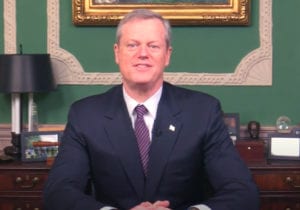Who is a member?
Our members are the local governments of Massachusetts and their elected and appointed leadership.

Gov. Charlie Baker addresses local leaders during the virtual MMA Annual Meeting & Trade Show on Jan. 22.
During the MMA Annual Business Meeting this afternoon, Gov. Charlie Baker thanked hundreds of local officials for their “invaluable” partnership during the COVID-19 pandemic and announced that he would be filing legislation next week to authorize $200 million for the Chapter 90 local road and bridge program.
The governor highlighted a number of programs and recently signed laws intended to help give an economic boost to main streets and downtowns that have suffered during the pandemic, particularly a $626 million economic development bond, $16.5 billion transportation bond and a new small business relief initiative that has distributed $232 million thus far to more than 4,000 small businesses. The multi-year transportation bond law includes funding for the popular Complete Streets and Municipal Small Bridge grant programs, as well as new Municipal Pavement Partnership and Local Bottleneck Reduction grant programs.
Touching briefly on his state budget plan for fiscal 2022, set to be released next Wednesday, he noted the 3.5% increase in Unrestricted General Government Aid announced yesterday by Lt. Gov. Karyn Polito, and said his recommendation would fully fund the first year of the Student Opportunity Act.
The act, signed in late 2019 to boost K-12 education funding by $1.5 billion over seven years, was not implemented in its first year, fiscal 2021, due to the pandemic. Baker didn’t say how much money full funding represents for fiscal 2022. In his budget plan filed last year before the pandemic hit, Baker said his proposed $303 million increase for Chapter 70 education aid would fully fund the first year of the Student Opportunity Act. Chapter 70 was ultimately increased by $107 million in the fiscal 2021 budget.
Baker pointed out that the administration and the Legislature worked hard to triple the balance of the state’s “rainy day fund” between 2015 and 2019, which is enabling the state to weather the economic fallout of the pandemic without raising taxes or making drastic budget cuts.
A former selectman in his hometown of Swampscott, Baker recognized how challenging the past year has been for local officials across the state and thanked them effusively for their hard work to navigate the pandemic and maintain essential services. In an informal segment of his appearance, he acknowledged that he is anxious to return to having face-to-face contact with local officials and constituents again, and that he has turned to regular evening walks with his wife, Lauren, to relieve stress.
Since he’s spending less time travelling the state, he said he’s also been doing more reading, and recommended “Lincoln on the Verge,” which gave him a “giant dose of perspective” on challenges that leaders have overcome. (For entertainment, he’s become a fan of “Ted Lasso,” a TV show he said he probably wouldn’t have discovered if not for the pandemic.)
The governor stressed the nonpartisan nature of local elections, which dovetails with his bipartisan approach to governing. He and Polito “take a lot of pride in having served in local government, and we’ve tried to bring that kind of attitude to our work the last six years.” He said state and local governments “are judged on what they accomplish, not what they oppose.”
Baker noted that during the 2014 campaign, he spent time in communities where, “if a Republican got 5% of the vote, it was a miracle” because he wanted to get to know people whose life experiences were different from his.
“Public life is a team sport,” he said. “It’s very hard to get much done … unless you’re willing to build coalitions and to recognize that you don’t know where your next one is coming from.”
Both the state and federal political systems, he said, are carefully designed not to convey absolute power to one individual or branch of government and to offer protection for minority points of view.
Regarding the polarization we face as a country, he said, “People need to make some new friends, and I don’t say that lightly. … We all tend, more often than not, to spend time with the people we know best. And COVID, by the way, makes what I’m talking about here dramatically harder to do.”
Asked how state and local leaders can make progress on racial equity and justice, he said leaders need to really work at listening to many perspectives, building trust and relationships, and being aware of the power of political speech.
“Recognize that your words matter – in both directions,” he said. “What you say can either take the temperature down or turn it up. What you say can help people work together or do just the opposite.”